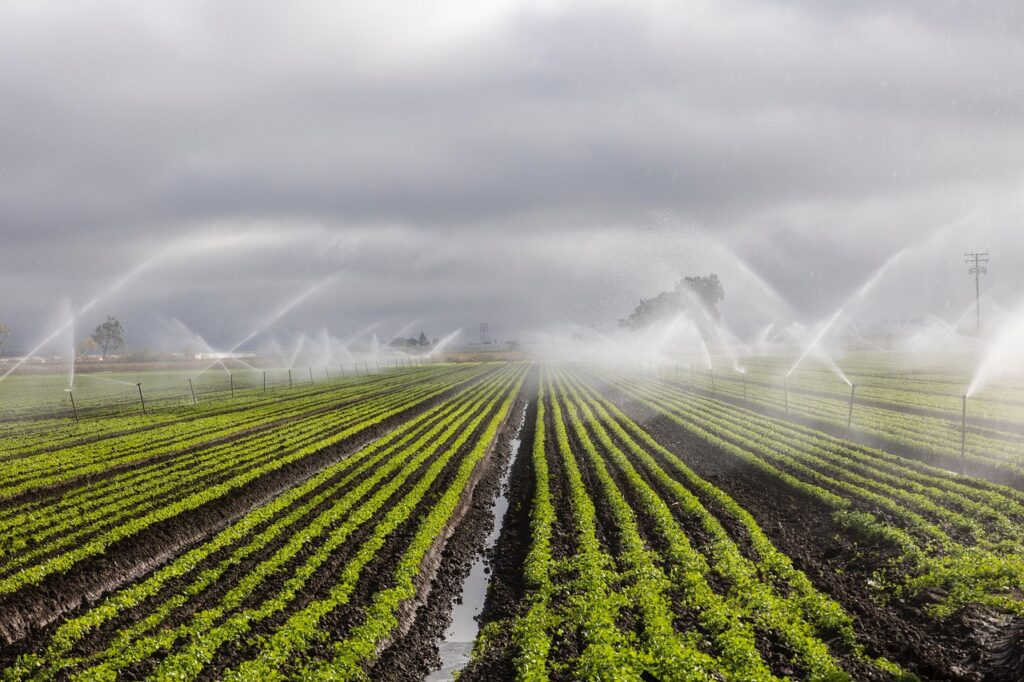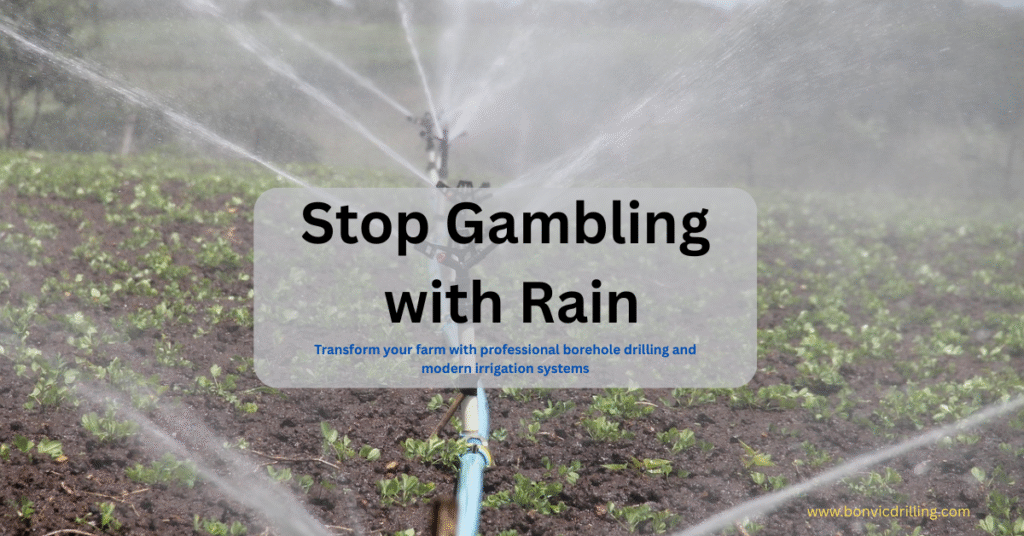Water is essential for growing plants and crops, especially in areas where rain can be scarce.
Finding a reliable water source is crucial for farmers to maintain healthy crops and produce food. Boreholes are one effective way to obtain water for irrigation.
But what exactly is borehole water, and how does it benefit irrigation?
In this post, we’ll explore borehole water’s advantages and challenges and how it can be a valuable resource for agriculture.
What Is Borehole Water?

Borehole water comes from deep within the ground. A borehole is a narrow, deep hole drilled into the earth to access groundwater. Compared to surface water sources like rivers and lakes, groundwater is often cleaner and less prone to contamination.
To create a borehole, specialized equipment is used to drill down to the aquifer, where water is stored.
Once a borehole is established, it can provide a consistent and reliable water supply for various uses, including irrigation, drinking, and industrial purposes.
Also read Why Gravel Matters in Borehole Drilling
Benefits of Using Borehole Water for Irrigation
Using borehole water for irrigation offers numerous advantages. Here are some of the key benefits that make it an appealing choice for farmers:
1. Consistent Water Supply
One of the most significant advantages of borehole water is its consistent supply. During dry seasons or droughts, boreholes can provide farmers with a dependable source of water.
Unlike surface water sources that can dry up, borehole water remains accessible, helping farmers sustain their crops even when the weather is challenging. This reliability is crucial for maintaining a steady food supply.
2. Quality of Water
Borehole water is often of higher quality than surface water.
Since it comes from deep underground, it is usually protected from pollutants and contaminants that can affect surface water sources. This means that crops irrigated with borehole water are less likely to be exposed to harmful substances, contributing to healthier plants and better yields.
Regular water testing can ensure that the borehole water is safe for irrigation.
3. Cost-Effectiveness
While drilling a borehole may have initial costs, the long-term savings can be substantial. Farmers often find that using borehole water is more cost-effective than relying on municipal water supplies or buying water from vendors.
Once the borehole is established, the ongoing costs for maintenance and operation are generally lower. This financial benefit allows farmers to allocate more resources to other areas of their agricultural operations.
4. Enhanced Crop Yields
With a reliable water source, farmers can irrigate their crops more effectively, leading to better growth and increased yields.
Studies have shown that crops watered with borehole water often outperform those irrigated with less reliable sources.
By ensuring that plants receive the water they need, farmers can produce higher-quality fruits and vegetables, contributing to food security and economic stability.
Also read The Science Behind Borehole Test Pumping
Potential Challenges of Using Borehole Water

While borehole water has many advantages, there are also challenges that farmers need to consider. It’s essential to be aware of these issues to ensure successful irrigation practices.
1. Water Quality Concerns
Not all borehole water is created equal. Some boreholes may yield water with high levels of salinity or harmful minerals. These elements can negatively affect plant growth and soil health.
To address this issue, farmers should conduct regular water quality tests. If the water is found to be unsuitable for irrigation, they may need to implement treatment solutions to improve its quality.
2. Environmental Impact
Over-extraction of groundwater can harm the environment. When too much water is taken from a borehole, it can lead to a drop in the water table, which can affect nearby ecosystems and other water sources.
Farmers must manage their water usage carefully to avoid depleting their aquifers. Sustainable practices, such as monitoring water levels and using water-efficient irrigation techniques, can help mitigate this impact.
3. Regulatory Considerations
In many regions, regulations govern the use of boreholes and groundwater extraction. Farmers must ensure they comply with local laws, which may require permits or licenses for drilling and water use.
Understanding and following these regulations is crucial for maintaining access to borehole water and protecting natural resources.
Best Practices for Using Borehole Water in Irrigation

If farmers choose to use borehole water for irrigation, following best practices can help them maximize the benefits while minimizing potential challenges.
1. Water Quality Testing
Regular testing of borehole water is essential. Farmers should check for contaminants such as bacteria, heavy metals, and salinity.
By understanding the quality of the water they are using, farmers can take the necessary steps to treat or improve it before using it for irrigation. Implementing a routine testing schedule can help ensure that crops are receiving safe and healthy water.
2. Efficient Irrigation Techniques
Using water efficiently is vital in irrigation. Farmers can adopt advanced irrigation methods, such as drip irrigation or sprinkler systems, to minimize water waste.
Drip irrigation, which delivers water directly to the plant roots, is particularly effective for conserving water and ensuring that plants receive adequate moisture.
These techniques not only save water but also improve crop health and yield.
3. Sustainable Water Management
Sustainable water management practices are crucial for the long-term success of borehole irrigation.
Farmers should monitor their water usage and implement conservation strategies to ensure they are not over-extracting from their aquifers.
Practices such as mulching, soil moisture management, and crop rotation can help maintain soil health and reduce water demand.
Also read Can Water Be Found in Rocky Areas?
Case Studies

Many farmers around the world have successfully implemented borehole irrigation, showcasing its effectiveness.
For example, in parts of Africa, communities have drilled boreholes to provide water for irrigation, leading to increased crop production and improved food security.
Farmers have reported better yields and healthier crops by using borehole water while adopting sustainable practices.
In India, farmers have turned to borehole irrigation in drought-prone areas.
By drilling boreholes and using efficient irrigation techniques, they have significantly improved their agricultural output, enabling them to withstand the challenges of changing weather patterns.
These case studies illustrate the positive impact of borehole water on agriculture and food security.
Conclusion
Borehole water can be an excellent irrigation resource, providing a consistent and high-quality water supply for farmers. Its benefits, such as cost-effectiveness and enhanced crop yields, make it an attractive option for sustainable agriculture.
However, farmers must also be mindful of the challenges associated with borehole water, including water quality concerns and environmental impacts.
By following best practices, such as regular water testing and efficient irrigation techniques, farmers can maximize the benefits of borehole water while protecting their natural resources.
As the world faces increasing challenges related to water scarcity and food security, borehole water has the potential to play a vital role in supporting sustainable agricultural practices.
Interested in learning more about how borehole water can benefit your irrigation practices?
Contact us at www.bonvicdrilling.com today!
You can find us on Facebook, YouTube, and TikTok for more insights and success stories.
Together, we can explore the best solutions for your farming needs and ensure that you have access to the water necessary for successful crop production.
Remember, sustainable farming starts with responsible water use!
Also read How Long Does a Water Borehole Last?


Pingback: Borehole Collapse? Here's How to Fix It Effectively